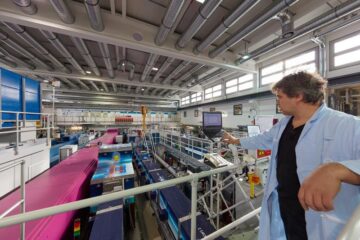Handling Robot SAMARA

The handling robot system SAMARA (System Applying Momentum transmission for Acceleration of an end-effector with Redundant Axis) combines the advantages of heavy payloads and wide working space from Scara robots with the high acceleration of Delta robots. This is achieved by a new motion sequence that is characterized by a steadily rotation of the first axis. Thus it is necessary to accelerate only small masses, as the main part of energy used for the motion cycle is kept for the following cycle.<br><br>By applying such a redundant axis the kinetic energy can be retained in the robot links during a picking process and returned to the effector for speeding up the whole robot additional to the drives torques. As the nullspace movement ends with a stretched second and third link, acceleration of the effector must be regarded as an impulse, leading to acceleration of 20g. <br>
SAMARA allows solving “pick and place“ tasks even for heavy loads extremely fast, precise and energy-beneficial with only little space required for the SAMARA robot itself.<br> <br> <strong>Benefits</strong><br> <ul> <li>Under actuated motion</li> <li>Highly dynamic operation of multiple arms within same work space</li> <li>Suitable for heavy payloads</li> <li>Wide working space</li> <li>High acceleration (up to 20g)</li> <li>Only low space required</li> <li>Flexible and very precise</li> <li>Combination of various end-effectors possible</li> <li>Continuous movement reduces energy loss caused by stopping and change of direction</li> </ul><br> <strong>IP Rights</strong><br> German Patent Application <br> <br> <strong>Patent Owner</strong><br> Technische Universität Berlin<br>
Weitere Informationen: PDF
ipal GmbH
Tel.: +49 (0)30/2125-4820
Ansprechpartner
Dr. Dirk Dantz
Media Contact
Alle Nachrichten aus der Kategorie: Technologieangebote
Neueste Beiträge

Bakterien für klimaneutrale Chemikalien der Zukunft
Forschende an der ETH Zürich haben Bakterien im Labor so herangezüchtet, dass sie Methanol effizient verwerten können. Jetzt lässt sich der Stoffwechsel dieser Bakterien anzapfen, um wertvolle Produkte herzustellen, die…

Batterien: Heute die Materialien von morgen modellieren
Welche Faktoren bestimmen, wie schnell sich eine Batterie laden lässt? Dieser und weiteren Fragen gehen Forschende am Karlsruher Institut für Technologie (KIT) mit computergestützten Simulationen nach. Mikrostrukturmodelle tragen dazu bei,…

Porosität von Sedimentgestein mit Neutronen untersucht
Forschung am FRM II zu geologischen Lagerstätten. Dauerhafte unterirdische Lagerung von CO2 Poren so klein wie Bakterien Porenmessung mit Neutronen auf den Nanometer genau Ob Sedimentgesteine fossile Kohlenwasserstoffe speichern können…

















